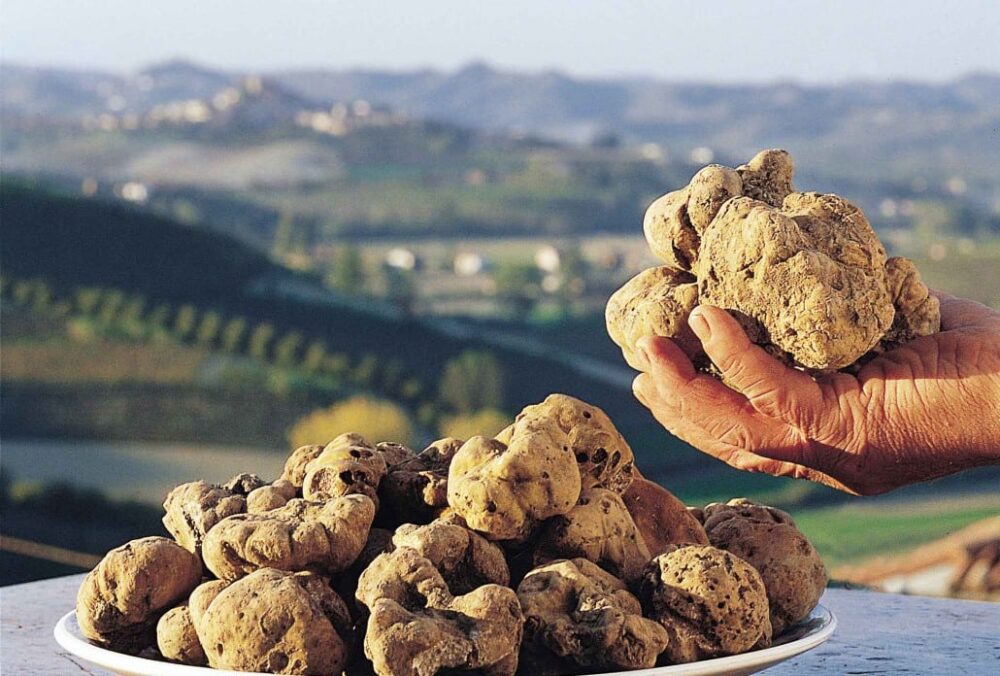CLIMATE CHANGE DOES NOT EVEN SPARE OUR MOST PRECIOUS CULINARY TRADITIONS AND THE WHITE TRUFFLE OF ALBA, ONE OF THE SYMBOL PRODUCTS OF ITALIAN GASTRONOMY, IS PAYING THE PRICE. AFTER TWO SEASONS OF DEVASTATING DROUGHT, THE PIEDMONT REGION HAS DECIDED TO POSTPONE THE START OF THE HARVEST OF THE PRECIOUS MUSHROOM TO OCTOBER 1ST, IN AN ATTEMPT TO PRESERVE ITS QUALITY AND SURVIVAL. THIS GESTURE, HOWEVER, DOES NOT SOLVE A DEEPER PROBLEM: THE A huge dumpIN SYMBIOSIS WITH THE ROOTS OF TREES AND STRICTLY DEPENDENT ON HUMIDITY, IS AMONG THE FIRST VICTIMS OF GLOBAL WARMING. IN ADDITION TO ITS GASTRONOMIC RELEVANCE, ITS DISAPPEARANCE WOULD REPRESENT AN INCELIBLE CULTURAL AND ECONOMIC LOSS FOR THE PIEDMONT TERRITORY AND FOR THE ENTIRE COUNTRY
The white truffle: between tradition and environmental fragility
Il white truffle d’Albaknown scientifically as A giant tubergrows underground in symbiosis with specific tree species such as willow, poplar, oak and lime. Its development requires soils rich in clay and sand and, above all, high humidity. This mushroom is considered an excellence of Italian and international cuisine, but its natural life cycle makes it particularly sensitive to climatic alterations. In recent years, Piedmont has faced summer seasons characterized by low rainfall and prolonged drought, conditions that have dried out the land and significantly reduced the truffle harvest.
The prospectors, known as trifolai, together with their trained dogs, the tabui, found little fruit due to the lack of sufficient moisture. This difficulty has caused great concern, so much so that the Regional Truffle Council and the trifolai associations have called for concrete action to preserve the precious mushroom.
A postponement to protect quality
This year, for the first time, the Piedmont Region has postponed the start of the truffle harvesting season by ten days, moving the date from 21 September to 1 October. The decision was made in response to concerns from prospectors and restaurateurs, as well as based on scientific studies of National Research Council (CNR), who highlighted the negative impact of drought on product quality. The objective is to give truffles more time to ripen and develop in more favorable climatic conditions.
If effective measures are not taken to combat global warming, the risk is that the white Alba truffle could disappear, with serious consequences for the entire ecosystem of the Langhe, Roero and Monferrato.
«L’postponed opening of the season is a fundamental step to protect the white truffle from climate change”said Marco Gallo, regional councilor for truffle cultivation and biodiversity. This decision is part of a broader strategy aimed at guaranteeing sustainability of truffle production and to safeguard a sector that generates a turnover of 250 million euros for the local economy, without counting the related activities International Alba White Truffle Fair, which every year attracts thousands of visitors from all over the world.
But let’s get to the event that has this prized fruit as its protagonist.
The International Truffle Fair
From 12 October to 8 December, Alba will host the 94th edition of the International White Truffle Fairan event that celebrates this extraordinary product every year, attracting chefs, enthusiasts and tourists from all over the world. In addition to being a showcase for truffles, the fair is also an opportunity to reflect on the future of the area and the need to adapt to climate change.
The mayor of Alba, Alberto Gatto, stated that the city intends to do its part to protect this “heritage of humanity” and promote sustainability, with initiatives such as the planting of trees, including truffle trees, to improve soil conditions and encourage the growth of the fungus.
A cultural heritage in danger
The value of the white truffle of Alba is not only economic, but also cultural. In 2021, theUNESCO recognized the “Searching and digging for truffles in Italy” as an Intangible Cultural Heritage of Humanity, underlining the importance of traditional knowledge and techniques handed down from generation to generation.
This centuries-old practice not only enriches our culinary culture, but also represents a profound connection with the territory and the natural environment. As for the strategy of postponing the harvest of the fruit, the question is: will it be enough?
The future of the white truffle
Postponing the harvest season is just one of many measures that may be necessary to ensure the survival of the Alba white truffle. While the postponement may improve the quality of this year’s crop, it does not solve the problem of increasingly unpredictable weather.
Experts agree that agriculture and food production will have to adapt quickly to climate change and truffles, due to their wild and delicate nature, are among the most difficult products to protect.
The importance of the white truffle is not limited to its gastronomic or economic value but concerns its uniqueness as a symbol of a natural balance that is under pressure today. If we do not intervene decisively and promptly, we could be faced with the irreparable loss of one of the most precious treasures of our natural and cultural heritage.
In this context, the 94th edition of the Truffle Fair will be not only a celebration of the past, but also an opportunity to imagine a future in which tradition and innovation can coexist, protecting the truffle and the territory that produces it from challenges globalizations that await us.
Sources
Regional Truffle Council
CNR

